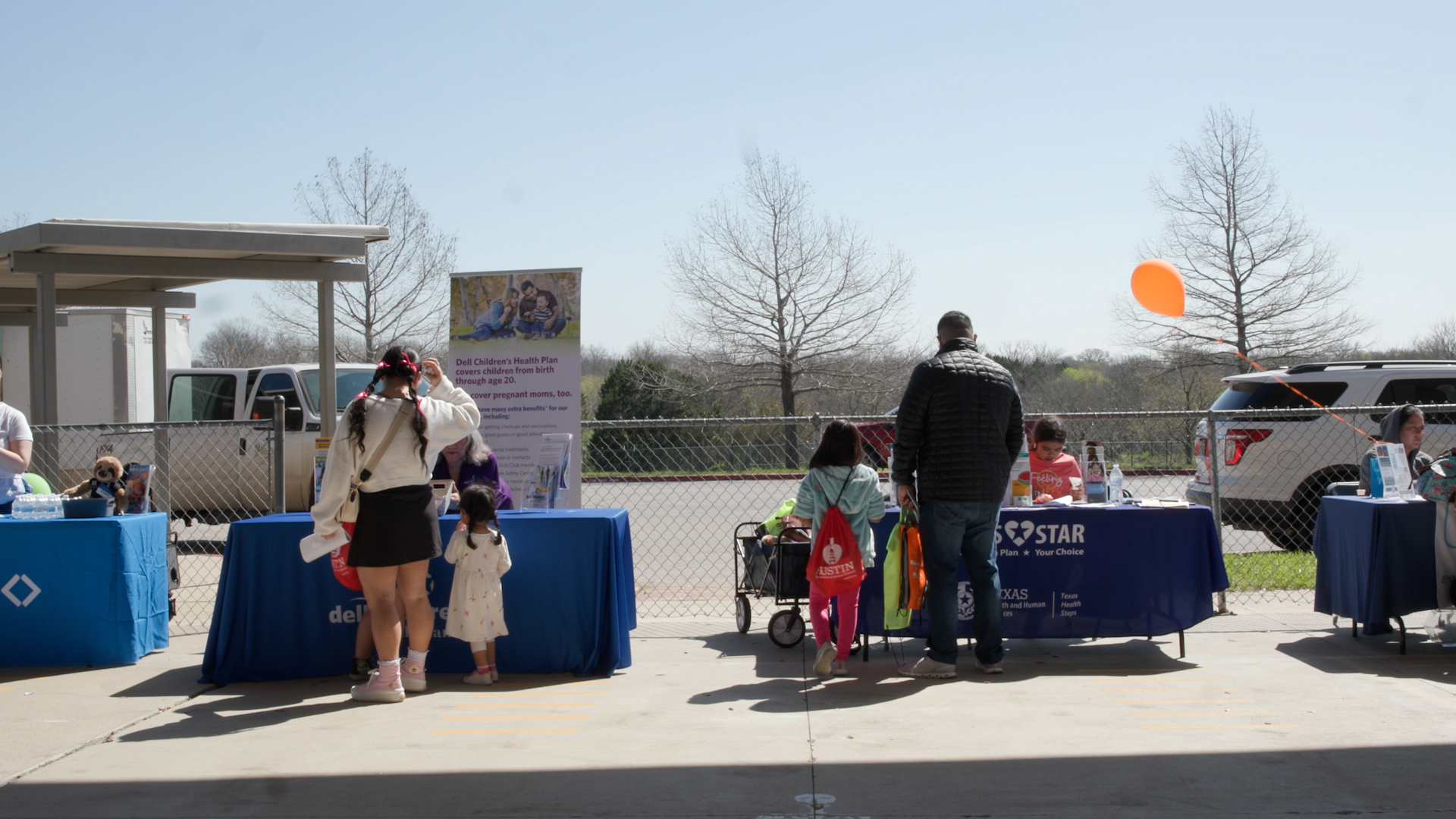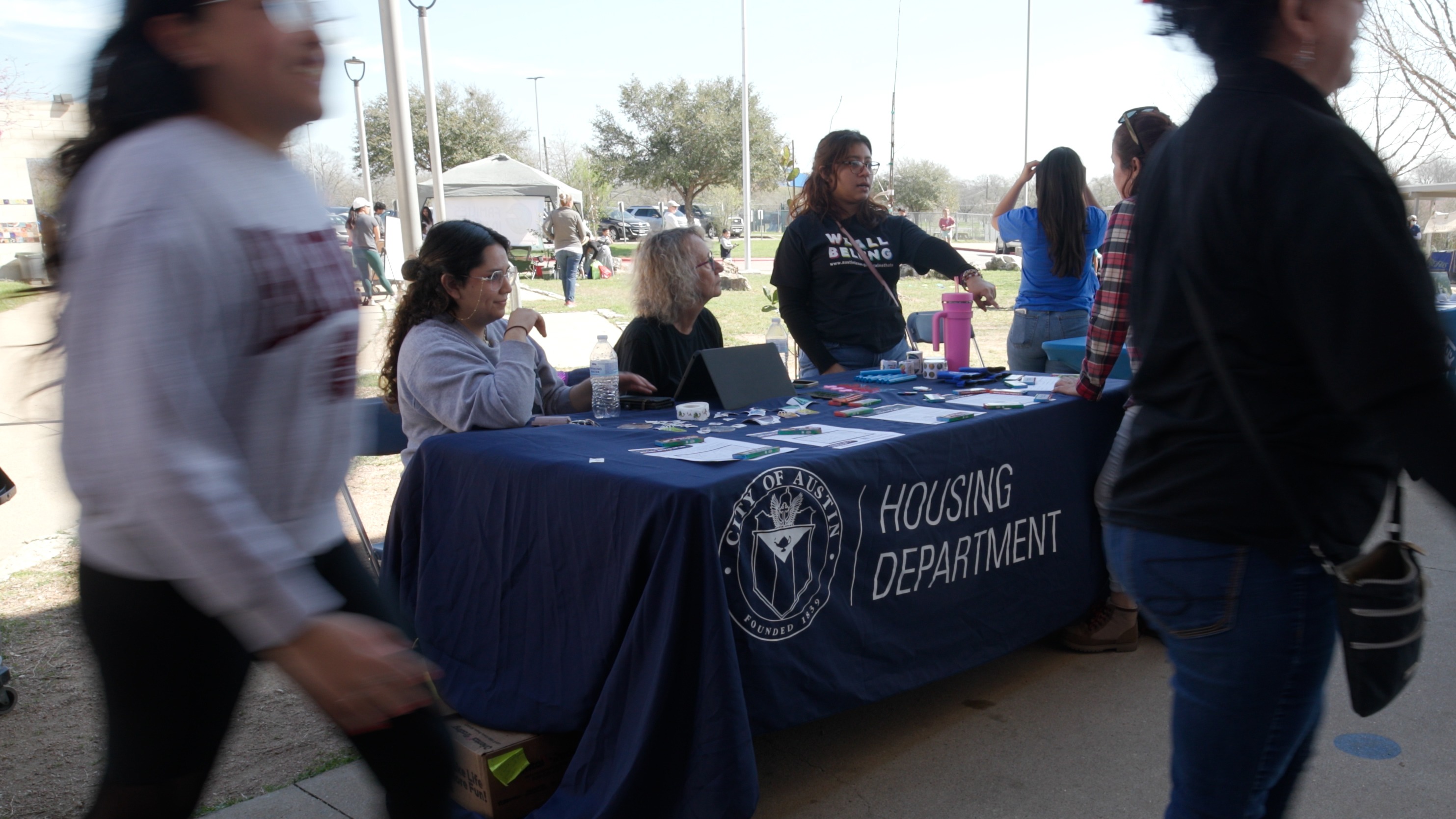‘If We Wouldn't Have Been There, Would They Have Kept Their Electricity?’: Navigators Keep Neighbors In Their Homes
Nancy McDonnell will admit she didn’t join the displacement prevention program just for altruistic purposes.
“I kind of did it for selfish reasons,” McDonnell says. “My house needs work … so I started looking around for resources that might be able to help me maintain it.”
McDonnell has lived in her Dove Springs home for 30 years. Last year, she was trying to look up the City of Austin’s home repair programs. What she found was a job opening as a displacement prevention navigator, helping her neighbors access resources from rent assistance to food access–anything they needed to stay in their homes but, much like her, didn’t know where to look. She applied for the position.
“I knew that if I was having so much trouble navigating, other people probably were too,” McDonnell says. “I think it's real important that people know what's out there.”
Flyers and crayons for the displacement prevention program lie on a table at a community event.
The displacement prevention navigator pilot program kicked off last year in Dove Springs and Colony Park. The goal is to prevent renters and homeowners from being pushed out of their communities by connecting them with resources. But the heart of this project are the navigators–15 community members with intrinsic knowledge of their neighborhoods, trained to connect residents with resources. But Elaina Fowler, the field manager for the program, says the navigators know more than local history.
“We trained them for three months, but they bring a lot of their professional experience because a lot of them are social workers themselves or work in case management themselves,” Fowler says. “So they bring a lot to the table.”
Since beginning community outreach last October, Fowler says they’ve put in over 300 field hours and have attended 37 community events. They also hold weekly office hours at the local library and rec center. At every location, the process is similar–talk with people about their needs, get contact information, and follow up with resources. In six months they have assisted 164 households. There’s a wide range of issues people need help with, but the navigators say the main thing people ask about is rental assistance.
“Rent prices have just skyrocketed,” says navigator Amy Perez. “I'm a renter myself, so I feel those price increases as well. And it's hard. Ever since the pandemic, a lot of people have had to work two or three jobs just to survive.”
Families walk past organizations tabling at a Perez Elementary school event. Since last October, Dove Springs navigators have attended over 30 community events.
Rents and housing prices have dipped recently in Austin, but they still remain well above pre-pandemic levels. And a new Harvard study showed 51% of renters in Texas are cost-burdened,’ meaning they spend more than a third of their income on housing. Roughly 95,000 Austinites are ‘severely cost-burdened,’ using over half their income on rent. But Alejandra Morales, a Dove Springs navigator, says they’ve learned housing means more than just a roof over your head.
“At the beginning we were focusing on housing resources, but we figured out that housing includes food, shelter, repairs,” Morales says. “So now we're kind of expanding into that.”
Inflation rates are finally starting to cool down, but groceries still cost more than they did a few years ago. Morales says the amount of times they’re asked about food banks is an example of how housing assistance dovetails with other needs. Residents tell her they’ll often use grocery money on utility bills because it's harder to get help with housing costs than food.
“Those people will go to the food pantry and put some of their money into a payment arrangement to keep their lights on,” Morales says.
From left to right, Zuvieta-Rodriguez, Nancy McDonnell and Esmeralda Chavez talk to community members at Perez Elementary.
Utility providers and the City of Austin have programs to help with bills, but residents may not know they exist. That’s something Perez has run into frequently since starting this job.
“We tell them what we do. They're like, ‘Oh, I didn't even know that was a thing,” Perez says. “There's a lot of assistance out there. But I don't really think that that information is being spread in a way that reaches people.”
Some residents may not feel safe seeking out assistance. Navigator Silvia Zuvieta-Rodriguez says many immigrant families are unaware of programs they can apply for, or are concerned about drawing extra scrutiny from government officials. She says those concerns keep many families living in areas that are too expensive.
“One of the reasons they're not asking for help is because of how anti-immigrant Texas has gotten,” Zuvieta-Rodriguez says. “So they're buying or renting apartments that are outside of their budget … because they fear leaving Austin. So for them it's particularly difficult.”
The future of the program remains to be seen. It’s scheduled to wrap up at the end of May. In an email, the City of Austin’s Housing Department senior planner Nelson Andrade said there was interest in building onto the program.
“Currently, we are looking at valuable feedback and program evaluations to guide next steps on how to support the community,” Andrade replied.
Rachel Salgado offers Easter candy to children at a Dove Springs easter egg hunt event.
Meanwhile, demand for assistance programs, from food to housing, remains high. But one thing drives the navigators to keep diving into the labyrinthine systems of online forms and waitlists: the chance to help someone.
“I wonder if we wouldn't have been there, would they have kept their electricity? Would they have had food for another week?” says Morales. “It keeps me going.”
Community journalism doesn’t happen without community support.
Got story ideas, advice on how we can improve our reporting or just want to know more about what we do? Reach out to us at news@klru.org.
And if you value this type of reporting, then please consider making a donation to Austin PBS. Your gift makes the quality journalism done by the Decibel team possible. Thank you for your contribution.
More in Education:
See all Education posts









Contact Us
Email us at news@klru.org